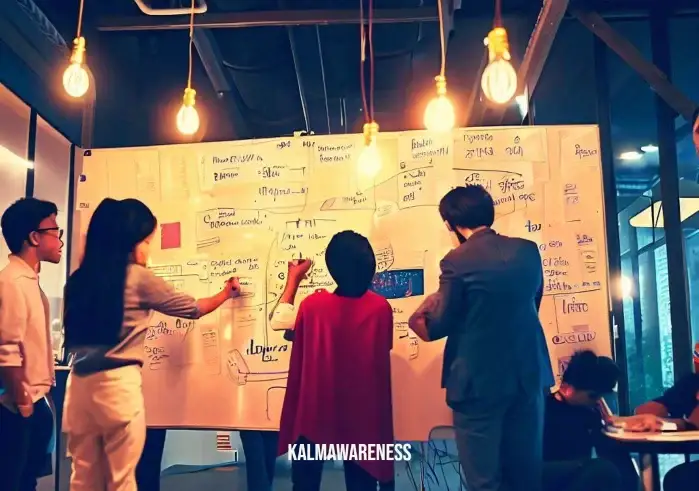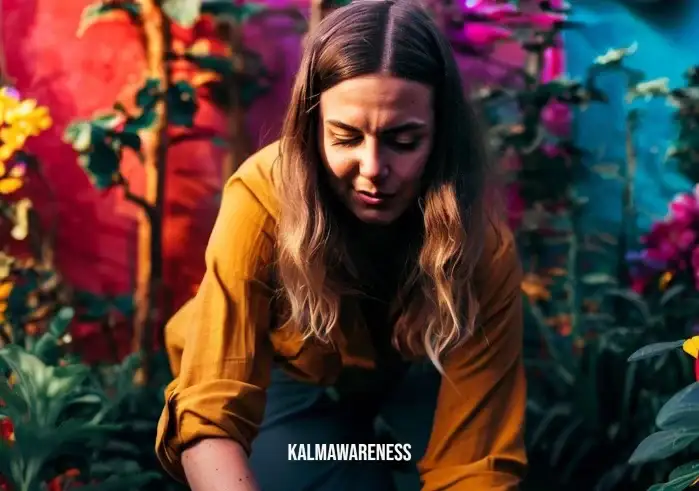Unleashing Your Potential Through Growth Mindset
The concept of a growth mindset, a term coined by psychologist Carol Dweck, is a revolutionary approach to personal development, motivation, and success. At its core, this mindset encourages the belief that one’s basic qualities, like intelligence and talent, can be cultivated and improved over time. Through effort, learning, and resilience, anyone can fundamentally enhance their abilities and achieve higher levels of personal and professional success.
Let’s explore how harnessing the power of a growth mindset can impact various aspects of your life and guide you towards a path of continuous learning and self-improvement.
The Power of Perception: Mind State vs Mindset
How we perceive the world and ourselves greatly influences our actions, responses, and the results we get in life. Understanding the distinction between a mind state and a mindset can shed light on why some people bounce back from failures while others wallow in self-doubt.
While a mind state is transient, often influenced by external factors, a mindset is a more stable set of beliefs that shape our reactions over time. Adopting a growth mindset essentially involves altering your perception, making you more resilient to failures and more open to learning.
Overcoming Self-Doubt
One of the significant hurdles in personal development is self-doubt. Often, we become our own worst enemies, setting limits on what we believe we can achieve. Our savior from self-doubt comes in the form of a growth mindset. By embracing challenges and viewing mistakes as opportunities to learn, we can overcome self-doubt and reach our potential.
Cultivating Your Mind
Just like a garden, our mind requires constant nurturing. By making the conscious decision to grow your mind, you take the first step towards cultivating a growth mindset. You begin to recognize that intelligence and skills aren’t fixed traits but rather abilities that can be developed over time.
The Role of Integrity in Personal Growth
Integrity plays a crucial role in personal growth. It’s about choosing courage over comfort, standing up for what you believe in, and sticking to your values, even when it’s challenging. It’s about remaining honest with oneself, a critical aspect of a growth mindset that enables self-awareness and reflection.
Navigating Personal Growth
Sometimes, personal growth might entail certain losses, like losing friends. As we change and evolve, our relationships also undergo transformations. With a growth mindset, however, we learn to accept this as a natural part of life’s journey towards self-improvement and self-actualization.
As we conclude this first part of the exploration of growth mindset, we invite you to delve deeper into this transformative concept. The subsequent parts will further uncover how a growth mindset can influence your personal and professional life, provide practical steps for cultivating it, and reveal how the principles of growth mindset can lead to effective leadership, stronger relationships, and ultimately, a more fulfilling life. Continue with us to unlock the potential of your mind.

A Deeper Dive into Growth Mindset: Tools and Techniques
As we continue our journey into the transformative world of the growth mindset, we’ll explore various techniques and strategies that can guide you in fostering this empowering perspective. Remember, the growth mindset isn’t merely an abstract concept, but a practical tool for personal development and success.
Steps for Cultivating a Growth Mindset
- Embrace Challenges: The first step towards a growth mindset is to view challenges as opportunities for learning and growth rather than obstacles. The article I Get To wonderfully illustrates the power of this perspective shift.
- Learn from Mistakes: Mistakes are not failures, but stepping stones towards success. Getting More of What You Want highlights the importance of learning from our errors and using them as a springboard for improvement.
- Practice Resilience: The ability to bounce back from setbacks is vital for fostering a growth mindset. As elucidated in Can Do Easy, resilience helps us to adapt and overcome challenges.
- Welcome Feedback: Constructive criticism is an invaluable tool for personal growth. By embracing feedback, we can make the necessary adjustments to our behavior and strategies. Check out the insights shared in Breaking the Habit of Being Yourself Criticism.
- Celebrate the Success of Others: Rather than fostering envy, a growth mindset encourages us to view the success of others as a source of inspiration and motivation. Read more in Giving It All We Got Guide.
The Role of Mindful Coaching
Another effective tool for cultivating a growth mindset is mindful coaching. This practice intertwines mindfulness principles with traditional coaching methods to create an environment that supports personal growth, resilience, and self-awareness.
Table: Growth Mindset vs Fixed Mindset
| Growth Mindset | Fixed Mindset | |
|---|---|---|
| Challenges | Embrace | Avoid |
| Effort | Path to mastery | Fruitless |
| Mistakes | Opportunities | Defeat |
| Criticism | Learn from | Ignore |
| Success of Others | Inspired by | Threatened by |
This table, inspired by the information shared in Mind Shift Definition and Mind Shift Meaning, presents a clear distinction between a growth mindset and its counterpart, the fixed mindset.
In the upcoming section of this article, we will explore the far-reaching implications of a growth mindset in various domains of life, including leadership, relationships, and personal happiness. Stay with us to learn how to incorporate the growth mindset into your everyday life and start reaping its immense benefits.

Growth Mindset: Transforming Leadership, Relationships, and Personal Happiness
The transformative potential of a growth mindset goes beyond individual growth and touches every aspect of our lives. In this part, we’ll delve into how the growth mindset can revolutionize leadership styles, enhance relationships, and boost personal happiness.
Growth Mindset and Leadership
“Leadership is not about being in charge. It’s about taking care of those in your charge.” This quote from Simon Sinek, a renowned leadership expert, aligns perfectly with the principles of a growth mindset. Leaders with a growth mindset foster an environment where continuous learning and adaptation are valued. They view their team members as works in progress, each with the potential for significant growth and development.
The Mindful Leadership Summit provides insights on how leaders can incorporate mindfulness and a growth mindset to create inclusive, adaptive, and forward-thinking organizations. Furthermore, the idea of leading with integrity, valuing courage over comfort, as discussed in Integrity Is Choosing Courage Over Comfort, is a testament to the growth mindset’s applicability in leadership.
Enhancing Relationships with a Growth Mindset
American author and activist Bell Hooks once said, “Knowing how to be solitary is central to the art of loving. When we can be alone, we can be with others without using them as a means of escape.” This quote perfectly embodies the connection between personal growth and healthy relationships. A growth mindset empowers us to seek self-improvement and self-love, which in turn enables us to form meaningful and authentic connections with others.
Articles such as 6 Ways To Strengthen Your Relationships In 2023 and I Want To Be A Kinder, Gentler Person shed light on how a growth mindset can transform our relationships and interactions with others.
Boosting Personal Happiness with a Growth Mindset
As the Dalai Lama famously said, “Happiness is not something ready made. It comes from your own actions.” Embracing a growth mindset can significantly enhance our personal happiness. It enables us to view setbacks as opportunities for learning, promoting resilience and fostering a sense of achievement.
In the spirit of a growth mindset, personal happiness is seen as a journey rather than a destination. Check out All You Can Do Is Try and It’s Time For A Change for more insights on how a growth mindset can influence your journey to personal happiness.
In the next part of our journey, we will venture into the world of mindful practices, such as meditation and yoga, that can aid us in fostering a growth mindset. Stay with us as we further explore the practical applications of the growth mindset and its influence on our daily lives.

Growth Mindset: The Catalyst for Mindful Practices and Personal Transformation
When we embrace a growth mindset, it doesn’t just transform our beliefs and attitudes—it can also have a profound effect on our daily practices and habits. As we journey into this next chapter, let’s delve into how a growth mindset can become a catalyst for mindfulness, personal transformation, and the cultivation of positive mental habits.
Growth Mindset and Mindfulness
“Mindfulness is the aware, balanced acceptance of the present experience,” said Sylvia Boorstein, an influential mindfulness teacher and psychotherapist. This awareness and acceptance are central to a growth mindset. They empower us to fully experience the present moment, learn from our experiences, and embrace opportunities for growth.
There are numerous resources available to help you integrate a growth mindset into your mindfulness practice. Mindful Coaching and the Mindful Life Project offer guidance on how to cultivate mindfulness in your daily life, while the MyLife Free Trial allows you to experience a range of mindfulness techniques and find what works best for you.
Growth Mindset and Personal Transformation
“Change is hard at the beginning, messy in the middle and gorgeous at the end,” says Robin Sharma, a leading authority on personal mastery. This quote encapsulates the essence of a growth mindset, with its emphasis on embracing change, persisting through challenges, and savoring the rewards of personal growth.
Our collection of articles can provide you with the tools and insights you need to embark on your personal transformation journey. For example, Getting More Of What You Want, Can Do Easy, and Breaking The Habit Of Being Yourself Criticism offer advice and techniques for overcoming personal obstacles and fostering a growth mindset.
The Growth Mindset and Positive Mental Habits
“The happiness of your life depends upon the quality of your thoughts,” Marcus Aurelius, the stoic philosopher, once said. This aligns perfectly with a growth mindset, which encourages us to cultivate positive mental habits.
Here’s a handy table summarizing key mental habits that a growth mindset fosters:
| Mental Habit | Explanation |
|---|---|
| Positive self-talk | Replace negative self-talk with constructive, positive affirmations. Refer to our article Self-Talk Images for more insights. |
| Embracing challenges | View challenges as opportunities for growth. More on this in All You Can Do Is Try. |
| Continuous learning | Approach life with a learner’s mindset. Our Mind Shift Definition article discusses this in detail. |
| Resilience | Develop the ability to bounce back from setbacks. Read more in Getting More Of What You Want. |
In our next chapter, we will explore how a growth mindset can inspire the next generation, shaping education and childhood development. Join us as we dive into the role of the growth mindset in shaping a brighter, more optimistic future.

Growth Mindset: Inspiring the Next Generation
The seeds of a growth mindset, when planted early in life, can yield a lifetime of benefits. In this final chapter, let’s explore how this transformative philosophy can inspire the next generation, shaping education, childhood development, and fostering lifelong resilience.
Growth Mindset in Education
A growth mindset can revolutionize education. By teaching students that their abilities and intelligence can be developed, educators can cultivate a love of learning and a resilience that is vital for accomplishment. After all, as Malala Yousafzai, the youngest Nobel Prize laureate, said, “One child, one teacher, one book, one pen can change the world.”
Let’s look at how the growth mindset can be incorporated into education:
- The Power of “Yet”: Teach students to reframe their thinking. Instead of saying “I can’t do this,” encourage them to say “I can’t do this yet“. This minor linguistic shift can lead to major changes in mindset. For more insights, you may refer to Can You Change A Man?
- Encouraging Effort over Ability: Praise effort, strategy, and progress, rather than innate talent. This approach, discussed in detail in I Get To, can empower students to see their abilities as malleable rather than fixed.
- Teacher Encouragement: As shown in In Adolescence, Encouragement From Teachers, a supportive learning environment that promotes curiosity and exploration can nurture a growth mindset.
Growth Mindset and Childhood Development
Building a growth mindset isn’t just for school—it’s a lifelong gift that begins in early childhood. By promoting these values at home, parents can lay the groundwork for their children’s future success.
Dr. Benjamin Spock, a prominent child psychologist, stated, “Trust yourself, you know more than you think you do.” These wise words mirror the essence of a growth mindset, which implores individuals to believe in their potential for growth and improvement.
Several strategies for cultivating a growth mindset in children include:
- Modeling a Growth Mindset: Children learn by imitation. When they see their parents embracing challenges, they’re more likely to adopt a similar attitude. For insights on positive modeling, check If I Can Learn To Do It.
- Promoting Perseverance: Teaching kids that it’s okay to make mistakes and that failure is a part of learning is vital for instilling a growth mindset. For a deeper understanding, you can refer to Don’t Be Sorry, Be Better.
Lifelong Resilience through a Growth Mindset
A growth mindset isn’t just about improving performance—it’s about building resilience. It gives individuals the courage to face challenges and the fortitude to bounce back from setbacks. “The human capacity for burden is like bamboo- far more flexible than you’d ever believe at first glance,” said Jodi Picoult, a contemporary author, encapsulating this idea perfectly.
The article We Don’t Have To Live This Way provides insights into the intersection of growth mindset and resilience, while Wait For Someone To Change emphasizes the role of individual effort in personal growth.
In conclusion, a growth mindset is a powerful tool for personal and collective transformation. It affects every aspect of our lives, from our relationships and careers to our personal wellbeing. Through a growth mindset, we can learn to embrace challenges, persist in the face of setbacks, see effort as a path to mastery, and, most importantly, realize that we can always learn, grow, and improve.
Join us for future discussions as we continue to delve deeper into the power of a growth mindset, and how it can help us all lead happier, more fulfilled lives.

Growth Mindset: A Key for a Happier, More Fulfilled Life
The journey of exploring the growth mindset, often also referred to as an expansive mindset or a learning mindset, has been illuminating. This final chapter aims to provide a fresh perspective, focusing on how we can apply this empowering philosophy to lead happier, more fulfilled lives, while engaging with life’s many opportunities and challenges.
Growth Mindset and Personal Fulfillment
Our pursuit of happiness and fulfillment often revolves around growth and learning, values which are inherently tied to a growth mindset. As the American author Mark Twain wisely said, “The secret of getting ahead is getting started.” By embracing a growth mindset, we accept that there’s always room for improvement, and thus we willingly set foot on the path to personal development.
Take a look at how the growth mindset intersects with personal fulfillment in our previous article: Should We Wait for Change?.
The Role of Growth Mindset in Nurturing Relationships
In our interpersonal relationships, a growth mindset can play a significant role. It encourages open communication, understanding, and mutual growth, proving crucial for strong, healthy connections. Albert Einstein once expressed, “Life is like riding a bicycle. To keep your balance, you must keep moving.” This encapsulates the essence of growth mindset within relationships, encouraging us to continually adapt and grow.
For a more in-depth discussion on this topic, check out Relationships: A Journey of Growth.
Growth Mindset in the Professional Realm
In the professional world, a growth mindset promotes adaptability, problem-solving, and continuous learning. It becomes the difference between viewing challenges as insurmountable obstacles and seeing them as opportunities for growth and learning. The renowned motivational speaker Zig Ziglar said, “It’s not what you’ve got, it’s what you use that makes a difference.” This perfectly captures the essence of a growth mindset at work.
Refer to our article Turning Professional Challenges into Opportunities for a more comprehensive view.
The Journey Continues
This is only the end of a chapter, not the story. As we close this segment on the growth mindset, remember that the journey of personal growth is never-ending. There are always new horizons to explore, fresh ideas to consider, and novel experiences to learn from. Embrace the process, value the progress, and celebrate the small victories along the way.
To quote Robert Louis Stevenson, “Don’t judge each day by the harvest you reap but by the seeds that you plant.” This thought aligns seamlessly with our discussions about the growth mindset. Plant seeds of growth, positivity, and resilience, and you’re sure to reap a harvest of personal fulfillment.
We invite you to continue this exploration with us, as we delve deeper into other fascinating aspects of personal development and well-being in future articles. We hope you found value in this series, and we look forward to continuing the journey with you.
For further reading, we recommend exploring our Mindset Magazine, a dedicated space for exploring various facets of psychology, personal development, and well-being. See you there!





